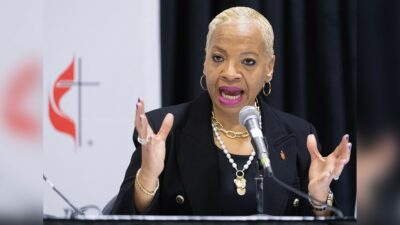As an Old Testament professor, I have a lot of opportunity to talk about trauma and abuse, because the Old Testament spends a surprising amount of time recounting narratives of abuse and giving voice to survivors of abuse. When I talk about these things, I will often tell my own story of growing up in a home with a beloved local-church deacon who also happened to be one the most violent and unpredictable people I’ve ever met.
I talk about begging church leaders to do something—anything—to stop the abuse that happened in our home. I talk about those leaders’ deep conviction that a man’s home is his castle and that a child’s and wife’s role was to submit to the man’s authority no matter what. I talk about the church leaders’ promises that God would honor my submission and their warning that to talk about his abuse was at best gossip and at worst evil rebellion, which, they reminded me, “is as the sin of witchcraft” (1 Sam 15:23).
As I have gotten some distance from my childhood and talked more openly about my experiences growing up in a home baptized in abuse, I’ve been shocked to learn that this view of male authority was not restricted to my church growing up. I have also been shocked to learn that becoming an adult, moving across the country, meeting and marrying my wife, having children, and together building a safe, stable home haven’t fully freed me from the effects of only about five years of living with an abusive man.
For much of my life—even as an adult—I have wrestled with the long-term impact that abuse has had on my ability to have safe and meaningful relationships with other humans, to love my spouse and children well, and even to navigate any sort of stress without a bottle of vodka or handful of pills. Working with a trauma-informed counselor has been of enormous benefit to me, and the book of Ecclesiastes is a faithful friend on this journey toward wholeness (what Hebrew calls shalom).
I started reading Ecclesiastes while I was in seminary. At the time I was drinking heavily and using opiates to ensure that I never felt anything—especially the despair that lingered from my teenage years.
Your tax-deductible gift helps our journalists report the truth and hold Christian leaders and organizations accountable. Give a gift of $30 or more to The Roys Report this month, and you will receive a copy of “Hurt and Healed by the Church” by Ryan George. To donate, click here.
I latched onto Ecclesiastes because of verse 1:2: “‘Everything is meaningless,’ said the Teacher, ‘completely meaningless!’” If a guy who wrote a book of the Bible could state with such conviction that “everything is meaningless,” then maybe I would be okay, maybe God would answer the prayer I had adopted from the man in Mark 9: “Lord, I believe; help my unbelief!”
But working through the book of Ecclesiastes in Hebrew with the help of a professor, I learned that the word typically translated “meaningless,” or “vanity,” doesn’t actually mean that at all. And what it does mean made all the difference for me as I attempted to navigate the Christian faith after growing up in an abusive Christian context.
The word in Hebrew is hebel. It is a relatively rare word in the Old Testament, and over half of its occurrences come in the book of Ecclesiastes.
You’re probably more familiar with the word from its usage in Genesis: it’s the name “Abel.” In that story in Genesis 4 we read that God accepted Abel’s sacrifice and rejected Cain’s, and though God implored Cain to do the right thing instead of giving into his jealousy and anger, Cain allowed the sin “crouching at the door” (Genesis 4:7) to overcome him.
Cain murdered Abel, and then Cain lived lived a long life (under protection from God, in fact), had many descendants, and founded a city. To put it another way, Cain received the blessings of obedience that would later be outlined in passages like Deuteronomy 7:11–15; 28:1–14; and 30:11–20. Abel, on the other hand, suffered the consequences of disobedience (see Deuteronomy 28:15–68). His life was cut short, leaving him with no children, no heritage, no material wealth. The correspondence between righteousness and blessing, wickedness and cursing was reversed.
Abel is the embodiment of a world turned upside-down, a world marked by sin. And that upside-downness, that broken relationship between actions and their consequences that all of us have experienced, is what Ecclesiastes picks up on and examines with the word hebel (again, in Hebrew “Abel”).
There are multiple examples that illustrate how Ecclesiastes is using hebel—and how we’ve misunderstood its meaning—but I’ll leave you with just one here.
Ecclesiastes 8:14 reads in the NIV, “There is something else meaningless that occurs on earth: the righteous who get what the wicked deserve, and the wicked who get what the righteous deserve. This too, I say, is meaningless.”
It’s a depressing sentiment, and one that most of us are likely to agree with—one that I agreed with. But the thing is, that’s not at all what Ecclesiastes is saying.
Read in light of the Cain and Abel narrative—along with Ecclesiastes’s broader use of Genesis that I explore in Ecclesiastes and the Search for Meaning in an Upside-Down World—Ecclesiastes is stating that “there is Abel that is done upon the earth: that there are righteous to whom it happens according to the deeds of the wicked, and there are wicked to whom it happens according to the deeds of the righteous. I said that this also is Abel.”
The reversal of the expected order of life is not meaningless, but it is most definitely like Abel. Ecclesiastes is thus acknowledging the plain truth that all of us have experienced: sometimes the disobedient receive blessing while the obedient receive curses. Sometimes abusers are exalted and protected while children suffer, and sometimes justice entirely eludes us in this life.
Genesis tells us that Abel’s blood cried out from the ground where Cain spilled it, and the New Testament book of Hebrews tells us that “by faith Abel still speaks.” Hearing Abel’s voice in Ecclesiastes didn’t magically take away my anger and pain and disillusionment, but it did make me feel seen, heard, understood. And it’s convinced me that there really was a way to navigate this upside-down world with my faith intact.
Editor’s note: This month, Russell’s book Ecclesiastes and the Search for Meaning in an Upside-Down World is available as a premium for those who support The Roys Report. Details here.
Russell L. Meek is associate professor of Old Testament at William Tennent School of Theology. His most recent books include Ecclesiastes and the Search for Meaning in an Upside-Down World and the co-authored Book-by-Book Guide to Biblical Hebrew Vocabulary. He writes a regular column on understanding and applying the Old Testament at Fathom Magazine.


















6 Responses
I would be interested in knowing the details of the abuse
The only thing I would caution Bible teachers on is saying such strong statements as, “the word typically translated … doesn’t actually mean that at all.” I heard things like this frequently enough in sermons growing up that it caused me to really begin to doubt my ability to read and understand the Bible. I was at such a point of unsteadiness in college that I began taking ancient Greek at my secular university. By third semester – my professor (who was very decidedly not a Christian – but knew of my interest in the Bible) helped me translate the book of John from Greek into English. My conclusion after an incredible amount of work: our English translations are wonderfully reliable (Yes, there may be benefit to a word study. I often use my 3 favorite English translations – one of which has especially good translation notes – to cross-check a verse I’m interested in. I also highly recommend the textual commentary by Bruce M. Metzger for those interested in learning more about the decisions made in translation.) In conclusion, the strength that the author gave his statement (“doesn’t mean … at all”) I find unwarranted (and for people like me – even harmful). At the same time, I did not know Abel’s name was the same word in Hebrew, and (after just double checking the authenticity of this statement) – I find that a very interesting fact that may well be worth mulling over.
Good to read that hardship drove this man deeper into relationship with the Lord and His Word, rather than otherwise. Perhaps the pain makes our universal desperateness more urgent, more anxious for God’s solace.
Russell, I am so sorry for the abuse that you endured. You are such an encourager, remaining positive in difficult circumstances. Your faith has been a witness to me. Thank you for being brave and telling your story.
Russell, thank you for writing this. It is a great help. I never endured abuse, but I have wrestled with the apparent “unfairness” of life. A few years ago our son developed, almost overnight, a very serious mental illness; shortly afterwards, he took his own life.
One of the things my wife and I wrestled with was how random and unfair the suffering seems. We are far from perfect, but we have honestly tried to follow Christ; yet the people we know who never darken the door of the church and who would laugh at the very idea of prayer….yeah, their kids seem to be doing great.
I hope you don’t mind that I re-posted your writing: https://mysteryandmeaning.com/2022/07/15/how-ecclesiastes-rescued-my-faith-by-russell-meeks/
Grateful for this article and the author’s honesty. Someone asked the author for detail of abuse…. Ugh. My mom was covered in bruises, black eye on occasions, hair missing. Broken nose. I saw my sister pushed down some stairs and crack her tailbone. My eldest brother tried to settle our father down once, they tumbled out the front door of our cement steps. I questioned something said once- hit in the face hard enough to fall straight down. Dad was a physician , loved and respected by many. People’s comments can be so crass and ridiculous. Enough details yet?